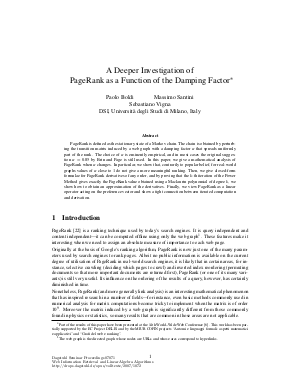A Deeper Investigation of PageRank as a Function of the Damping Factor
Authors Paolo Boldi, Massimo Santini, Sebastiano Vigna
-
Part of:
Volume:
Dagstuhl Seminar Proceedings, Volume 7071
Part of: Series: Dagstuhl Seminar Proceedings (DagSemProc) - License:
 Creative Commons Attribution 4.0 International license
Creative Commons Attribution 4.0 International license
- Publication Date: 2007-06-28
File

PDF
DagSemProc.07071.3.pdf
- Filesize: 399 kB
- 19 pages
Document Identifiers
Subject Classification
Keywords
- PageRank
- damping factor
- Markov chains
Metrics
- Access Statistics
-
Total Accesses (updated on a weekly basis)
0PDF Downloads0Metadata Views
Abstract
PageRank is defined as the stationary state of a Markov chain. The chain is obtained by perturbing the transition matrix induced by a web graph with a damping factor $alpha$ that spreads uniformly part of the rank. The choice of $alpha$ is eminently empirical, and in most cases the original suggestion $alpha=0.85$ by Brin and Page is still used. In this paper, we give a mathematical analysis of PageRank when $alpha$ changes. In particular, we show that, contrarily to popular belief, for real-world graphs values of $alpha$ close to $1$ do not give a more meaningful ranking. Then, we give closed-form formulae for PageRank derivatives of any order, and by proving that the $k$-th iteration of the Power Method gives exactly the PageRank value obtained using a Maclaurin polynomial of degree $k$, we show how to obtain an approximation of the derivatives. Finally, we view PageRank as a linear operator acting on the preference vector and show a tight connection between iterated computation and derivation.
Cite As Get BibTex
Paolo Boldi, Massimo Santini, and Sebastiano Vigna. A Deeper Investigation of PageRank as a Function of the Damping Factor. In Web Information Retrieval and Linear Algebra Algorithms. Dagstuhl Seminar Proceedings, Volume 7071, pp. 1-19, Schloss Dagstuhl – Leibniz-Zentrum für Informatik (2007)
https://doi.org/10.4230/DagSemProc.07071.3
BibTex
@InProceedings{boldi_et_al:DagSemProc.07071.3,
author = {Boldi, Paolo and Santini, Massimo and Vigna, Sebastiano},
title = {{A Deeper Investigation of PageRank as a Function of the Damping Factor}},
booktitle = {Web Information Retrieval and Linear Algebra Algorithms},
pages = {1--19},
series = {Dagstuhl Seminar Proceedings (DagSemProc)},
ISSN = {1862-4405},
year = {2007},
volume = {7071},
editor = {Andreas Frommer and Michael W. Mahoney and Daniel B. Szyld},
publisher = {Schloss Dagstuhl -- Leibniz-Zentrum f{\"u}r Informatik},
address = {Dagstuhl, Germany},
URL = {https://drops.dagstuhl.de/entities/document/10.4230/DagSemProc.07071.3},
URN = {urn:nbn:de:0030-drops-10722},
doi = {10.4230/DagSemProc.07071.3},
annote = {Keywords: PageRank, damping factor, Markov chains}
}
